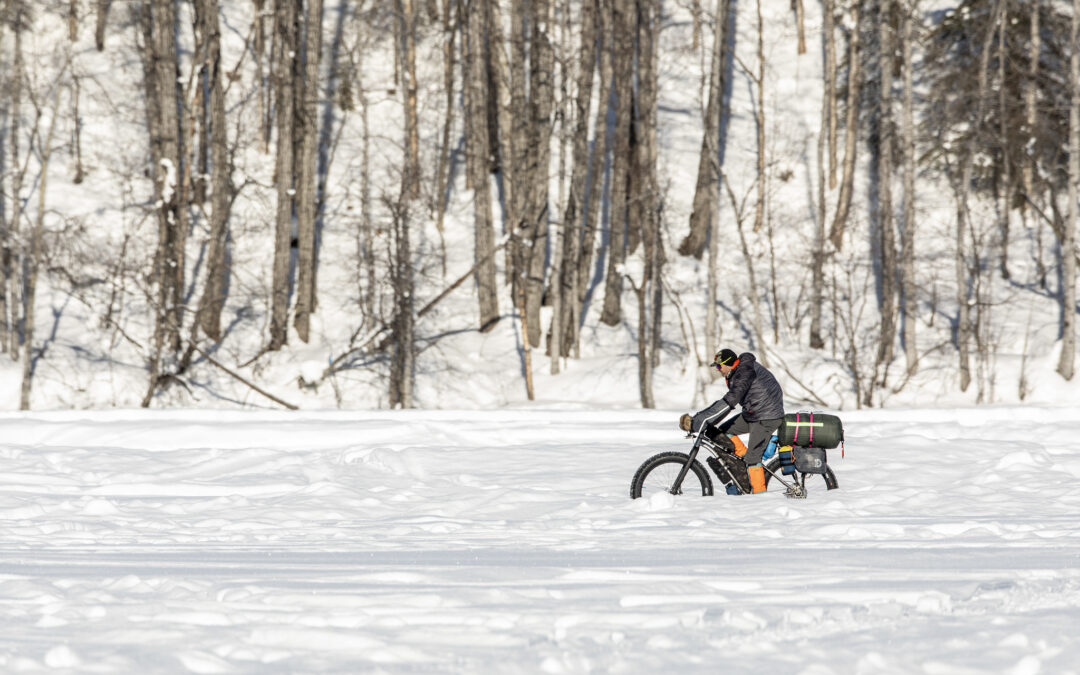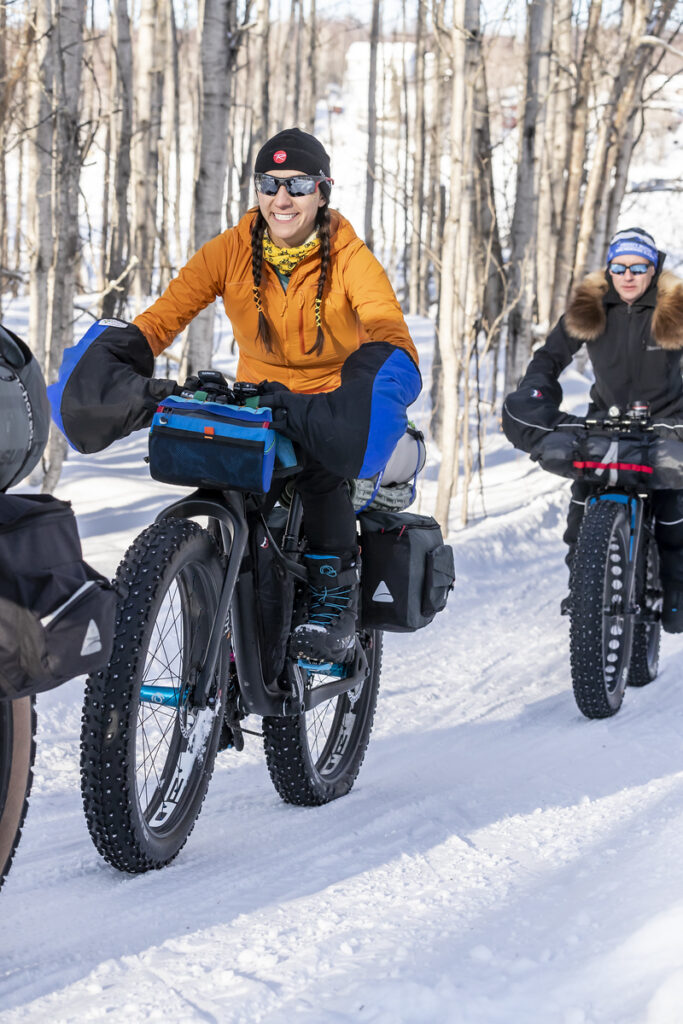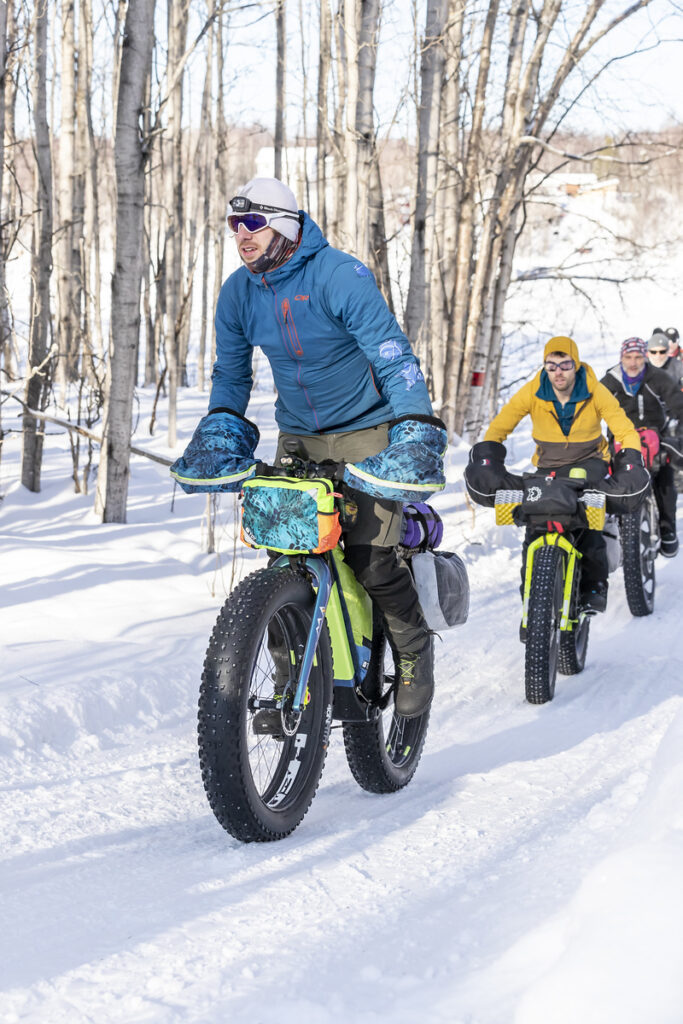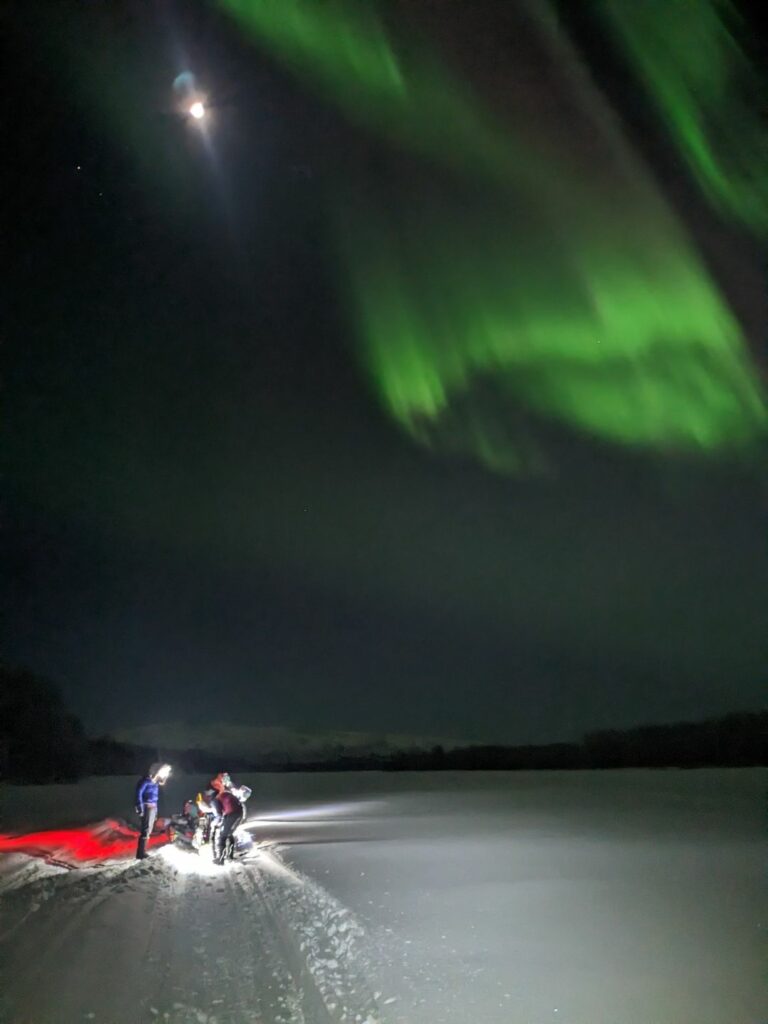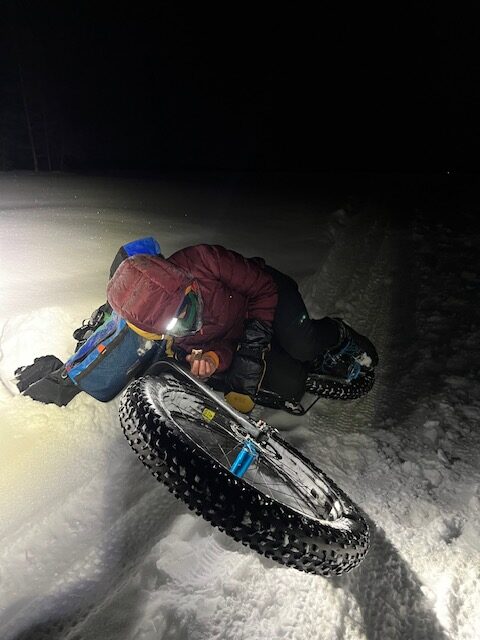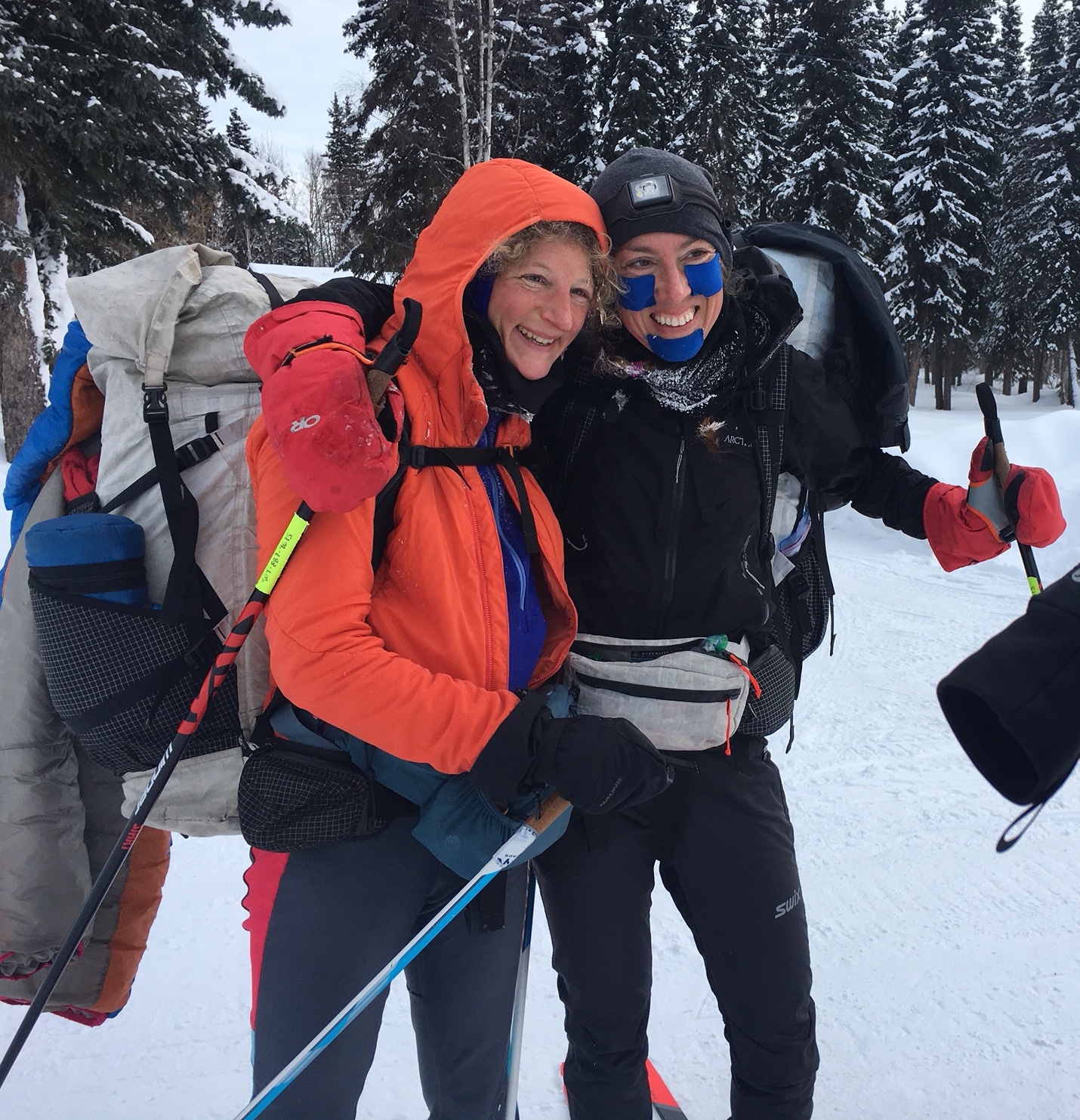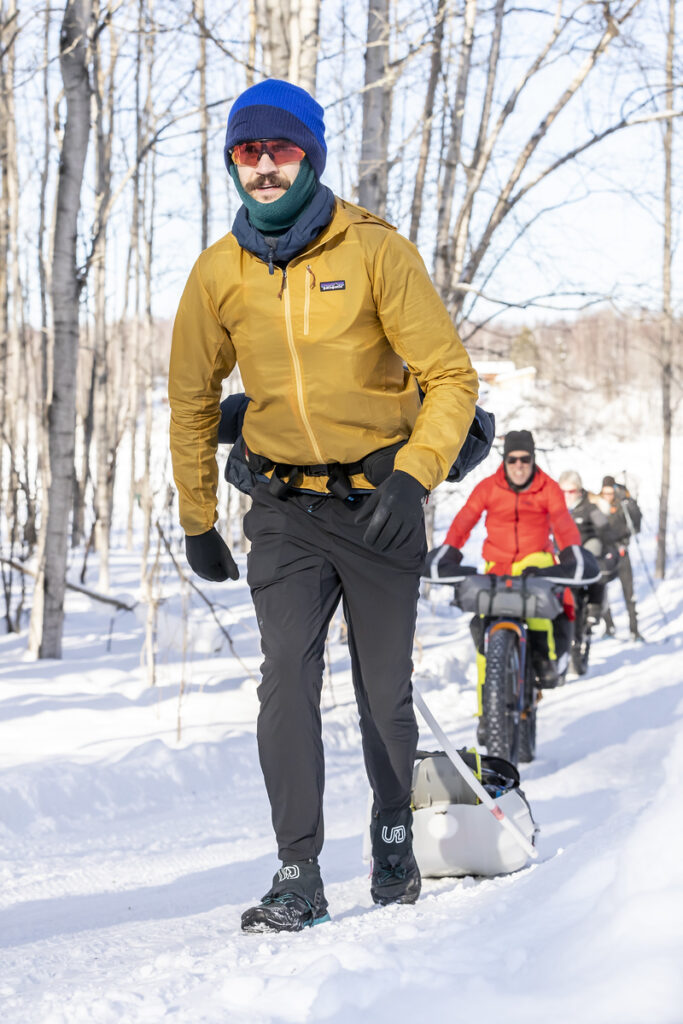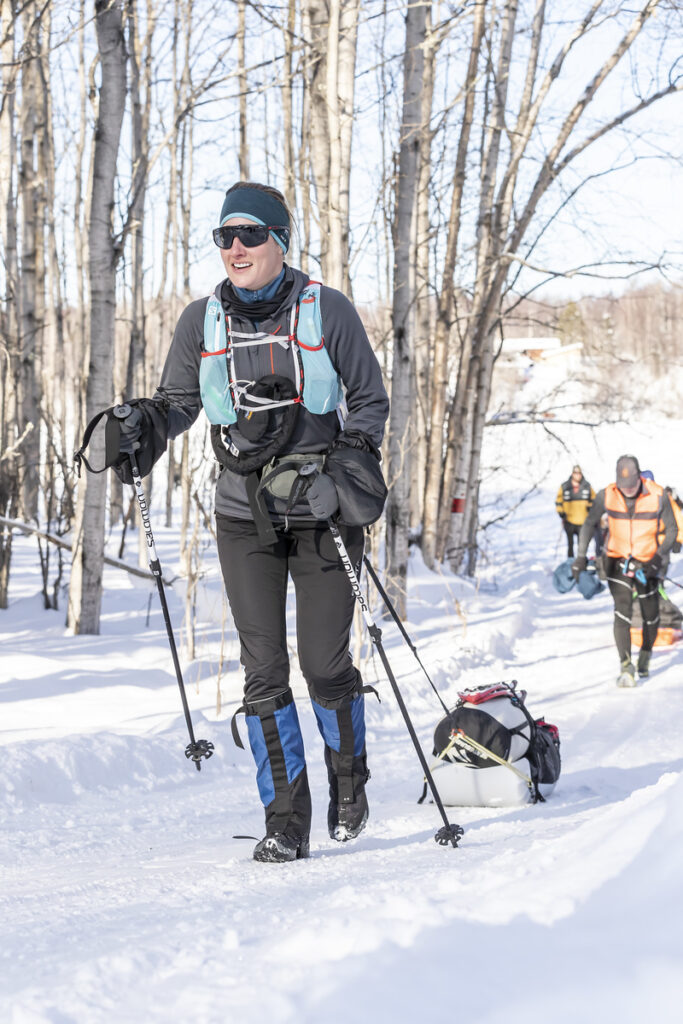Kinsey Loan struggled to stay warm as she pushed her fat bike with two flat tires on the Yentna River with the temperature around 25 below zero.
Her rookie run in the Iditarod Trail Invitational, a 300-plus mile human-powered event from Knik to McGrath, had barely begun on Feb. 26 and Loan was already considering dropping out.
“I was on the struggle bus,” Loan said, adding that she’d texted friends and family saying her start was a “dumpster fire.”
After about 10 hours of pushing her Fatback Corvus, Loan — an accomplished road and mountain biker but less experienced fat biker — finally reached Yentna Station lodge around 7 a.m. She’d been underway for 17 straight hours.
Loan was tired and demoralized but in better shape than many. One biker from England was grimly re-warming his frostbitten hands in a bowl of tepid water. Later she witnessed a hypothermic and frostbitten foot traveler get medevaced by helicopter from the lodge (race director Kyle Durand said he later received hyperbaric chamber treatment in an effort to limit tissue damage).
Loan regrouped with food and rest and managed to get both tires re-inflated. About four hours after she arrived, Loan rolled out of the lodge amid sunny skies and a slightly warmer, but still frigid, temperature.
“Once I had a reset, I was happy to ride again,” said Loan, 29, of Eagle River.
Four days later, Loan handily won the women’s division, and placed 12th overall, with a finish time in McGrath of 5 days, 13 hours and 33 minutes.
Tyson Flaharty of Fairbanks won his third ITI, pedaling (and pushing) 306 miles in 3 days, 1 hour and 30 minutes.
Iditarod Trail Invitational is arguably among the world’s longest, oldest and toughest human-powered events. It began as the 210-mile Iditabike in 1987 and has grown into a 100-person invitational for which the race directors receive hundreds of applications annually. In 2023, racers from 15 countries — including New Zealand, Japan, Brazil, France, Italy, Germany, and Canada — were accepted, along with entrants from more than 20 U.S. states.
The 2023 edition has proven to be particularly onerous.
“This was an especially tough year,” co-race director Kyle Durand said Monday from the McGrath Outpost, which serves at the finish for the 300-miler and a checkpoint for those continuing on the 1,000-miler to Nome. “The relentless cold created significant challenges for the athletes.”
That’s resulted in a high rate of attrition for a variety of reasons: cold-related injuries, illness, exhaustion, lack of motivation, and fear of forging on in potentially dangerous conditions where a mistake in remote country could be catastrophic. While the first half to Puntilla Lake includes multiple lodges in addition to checkpoints, once racers crest Rainy Pass the lodges disappear, and the checkpoints are fewer in number.
“So far, we have 44 scratches out of 96 starters. That’s significantly greater than normal,” Durand said.
Those that finished were slower than average. That included Flaharty, whose time was more than a day behind John Lackey’s overall record of 42 hours and 32 minutes.
“That’s attributable not just to the cold but the leaders ran into a windstorm over Rainy Pass,” Durand said. “I don’t think there was an easy day out there.”
Loan’s journey was anything but easy.
Loan, like most others, encountered fresh snow and wind that drifted in parts of the trail and forced her to push a heavily loaded bike. Once she crossed Rainy Pass in the Alaska Range — some encountered a ground blizzard that obliterated the trail — a second wave of cold punished the racers, most of whom sought shelter in checkpoints while a few set up primitive bivy camps to catch a bit of fitful rest. There were also countless energy-sapping moguls between Rohn and Nikolai to negotiate.
Loan initially signed up for the ski division but recognized that she hadn’t skied enough this winter. So she switched to biking, although her preparation for that discipline was also not ideal. Unlike many riders who had been preparing all year, Loan was banking on her base fitness to carry her through.
“I didn’t really train for this. I went on one long training ride,” said Loan, the daughter of legendary biker Sheryl Loan.
For much of the race, Loan dealt with debilitating knee pain.
She received a boost when her partner, Mark Moeller, waited for her at the bleak checkpoint of Rohn so they could ride the rest of the way together, both for safety and companionship.
But the first day out of Rohn, Loan banged her hand falling into a tree in the Farewell Burn.
“One of my many falls,” she said. “I was just trying to ride that narrow (fat bike) line.”
An x-ray in Anchorage on March 7 confirmed Loan’s suspicion: she’d broken the metacarpal bone of the ring finger on her left hand. Loan did her best the next few days to limit jarring the hand. When she crashed she simply tipped over instead of trying to catch herself.
The gritty Loan gritted her teeth to deal with the pain and completed the event. The many travails have not dissuaded her from returning: she plans to ride the 1,000-mile version of ITI to Nome with Moeller in 2024.
Late Tuesday night, the ITI 300 wrapped up with skier Jaclyn Arndt’s arrival after nearly 9 days and 9 hours.
As of Wednesday afternoon, 16 racers remained on the trail bound for Nome. Biker Miron Golfman, who was second to McGrath, led the way after reaching the ghost town of Iditarod at mile 423.
In other divisions:
Ski Division — Robin Beebee and Christy Marvin set a new women’s record in the 300-miler the hard way: they spent four consecutive nights camping in bitter cold after their traveling schedule kept putting them in checkpoints before they were ready to stop for the day.
Beebee, 47, of Anchorage and Marvin, a 42-year-old mother of three from Palmer best known as a champion mountain and trail runner, reached McGrath Sunday afternoon after 6 days, 23 hours and 13 minutes on the trail. That shaved 84 minutes off Lindsay Cameron’s record from 2018.
Breaking the ski record is even more remarkable given that the cold temperatures significantly limited glide that skiers rely on for efficient travel. Skiers were instead mostly reduced to shuffling on their classic skis and were rarely able to employ the much faster skate ski technique — which is Beebee’s specialty, even on narrow trails. Both Beebee and Marvin opted to wear backpacks instead of pulling a sled like some skiers prefer.
Men’s winner Matias Saari, 52 of Anchorage, dodged the coldest weather by traveling checkpoint to checkpoint (and to one shelter cabin) and finished in 6 days, 9 hours and 54 minutes.
Gavin Woody of Bellevue, Wash., became the third racer in history to complete all three disciplines (bike, ski, foot); the other two are Lars Danner and Amber Bethe.
A record number of 11 skiers started the event.
The lone skier to potentially travel beyond McGrath is 65-year-old Mattieu Bonnier of France, who was still in McGrath on Wednesday afternoon.
Foot Division — Herman Watson, 38, of Bozeman, Mont., marched relentlessly while pulling a sled to finish the 300-miler in 6 days, 22 hours and 56 minutes. Watson outlasted Frenchman Thierry Corbarieu after the pair engaged in a leapfrogging duel for days. At the final checkpoint of Nikolai 48 miles from McGrath, Corbarieu conceded to Watson, calling him “the king” in broken English.
Sonya Tinucci of Colorado won the women’s foot division in 7 days, 9 hours.
Corbarieu continued on towards Nome and on Wednesday afternoon was at mile 381 with fellow foot travelers Beat Jegerlehner — who is racing his 10th ITI — and Takao Kitada.
The slowest of the foot travelers have been known to require 30 days to reach Nome.
For unofficial live tracking results, visit https://itialaska.com/tracking

